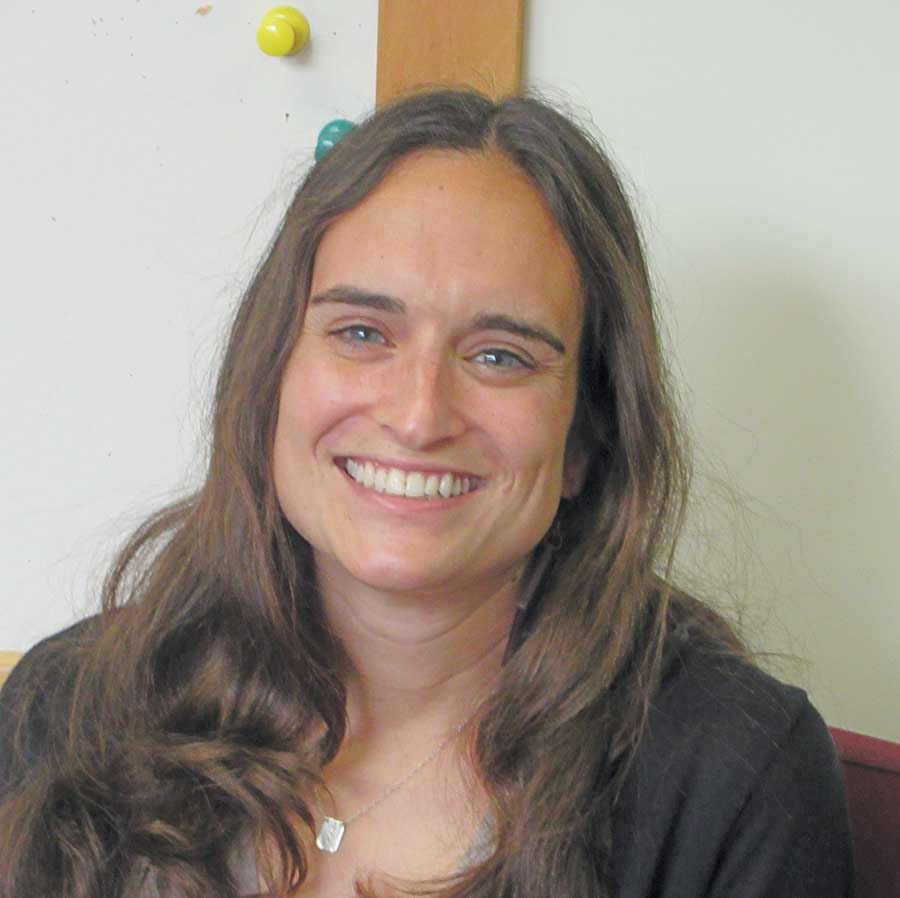The great imposter
Emily Scott
Dr. Emily Scott is an assistant professor of behavioral sciences at
NVU-Johnson.
What got you interested in psychology?
I started taking psychology classes in college and I really loved it out of all my classes. I found humans really interesting. Psychology’s such a broad field, there’s just so much to dive into. So, I just kept taking more classes and then was like, okay, I guess I like this.
What’s one piece of advice that you would give to students that are interested in your field?
What’s cool about the field is that, because psychology is really broad, you can do a lot of different things with a psychology degree. So, stay open-minded. Get as many different experiences as you can. And from there, there’s a lot of different options in terms of advancing in the field. There’s a lot of different pathways since the field is so broad and that can feel overwhelming, but as you get more experience, you can start to narrow that down. So, I would just say it’s a journey, and try to enjoy the journey, and then you’ll start getting a better sense of what really excites you.
Why was your orientation lecture on the imposter syndrome? Do you suffer from it?
Oh, I’m glad we’re coming back to this. I think it’s worth talking openly about it. One thing that was cool after I gave that talk was how many people came up to me afterwards- faculty, students- saying “I suffer from this. I’ve experienced this before.” So, it’s kind of part of the human experience for most of us, and I’d say it’s definitely something I still struggle with. Not on a daily basis anymore, because it does get better over time. But I had faculty who have been teaching for a long time come up to me and say, “I still feel this way.” I talked about it because that’s especially something I was feeling at the time and it just felt like the most genuine thing to talk about. I was asked to give the speech because I was new, and when you’re coming into a new environment, that imposter syndrome kicks in, so it felt like something that I had in common with new students who also might be experiencing that as they enter college.
What is your proudest accomplishment?
Wow, that’s a question. I wish I had something fun, not-school-related, but I’ve spent so much time in school. My proudest accomplishment is probably surviving grad school and getting my PhD. I wish I had a more fun one, but this is where I’ve spent the most time. I don’t have time for much else.
What brought you to Johnson?
As I was finishing up my PhD, I was applying for jobs, and I knew I liked teaching. I was looking at universities where there were more opportunities to teach and smaller classrooms. I’m also from the East Coast, so I was looking to come back. I just got a really good vibe during my interview with the faculty of Johnson and how much they cared about the students, it seemed like a really good environment to work in. I was at University of Utah for grad school, and that was a very research-heavy institution. So, the field is very different, it’s much more about your research, much less about getting to interact with students on a smaller basis. I was really glad Johnson picked me.
What is your favorite way to eat pasta?
With a fork? Is this a fork versus spoon question? My friends came up with a theory about pasta, and fork versus spoon people, so that’s why I immediately was like, fork. I’m a fork person. The theory is that spoon people are crazy, like you’re crazy if you use a spoon to eat mac and cheese. There’s something wrong with you. But to answer your real question, I have some Italian roots, so I should be better at eating pasta, but I’m pretty basic. Just getting some really good sauce. Whether that’s really nice, store-bought stuff, or I also like to try to make my own sauce a lot.
What’s one thing that you think everyone should do if they could at some point in their life?
Step outside your comfort zone. That could look like traveling or being exposed to people whose views are different than yours or putting yourself into an unfamiliar situation. I think stepping outside of your comfort zone always promotes internal growth and just allows you to see the world a little bit differently. If we all did more of that, then we would probably be better off.
What three people that are alive would you most like to have over for dinner and why?
I love and hate this question. Trevor Noah. I just like his stand up and I think he would be fun to talk to and just make humor of whatever the conversation was that night. I also feel like I need to throw a psychology person in there. Not Freud… No interest in that. I’ll come back to this. I would say Ruth Bader Ginsburg, just because she saw a lot of change in women’s rights over the course of her very long career. I would want to hear her talk for a while, because she was also an incredibly poised speaker and just very deliberate with her words. And the way she strategized for women’s rights was really fascinating to me. And you know what, maybe I will throw Freud in there because I want to see Trevor Noah react to the crazy things he says. And RBG would just be sitting there like, what is going on? That would be a pretty fun dinner.
Do you have any guilty pleasures?
I don’t know if this counts as a guilty pleasure. I do like watching home remake shows, those are just very satisfying to watch. I think I’m going to stick with that rather than my other answer.
What would your tombstone read?
My friends and I one night were coming up memoir titles for each other. The one that came up for me was, “I’ll be there in five minutes.” Because I’m always 5-10 minutes late. Except for my classes, I have never been late to a class. But for everything outside of work, I’m 5-10 minutes late. If you include that, make sure you include that I’ve never been late to anything work related.
What was the best piece of advice that you’ve ever received?
I’ve received a lot of good advice over the years, I’ve been lucky to have really good mentors. Some of the more general advice I’ve gotten as I moved through my career and encountered different struggles was the idea of just kind of being able to trust in the process. Things are gonna happen in your life, and sometimes things that go wrong are a blessing in disguise. You need to let things take their course and try to take a step back when you can and try to enjoy the journey because a lot of things just work themselves out over time.
What’s the worst advice you’ve ever received?
The worst was to not major in psychology because I won’t get a job. I was told that by my undergraduate advisor, and not only is it not true, but psychology as a field is so broad and growing, that there’s so many different things that you can do. And right now, mental health professionals are in more demand than ever. I’m glad I continued this path and didn’t listen to that.
What’s your biggest pet peeve?
I ask this question to my classes as part of an icebreaker. I have two. My pet peeve in class is when students talk over each other or over me. Also, people who snore. I’m a light sleeper and I just can’t deal with it.
What was your favorite part about quarantine? Have you managed to roll any of that over into your daily life?
I got more into yoga, which was something I’ve been wanting to do for a while. I got into more of a routine of it during COVID and that has just really helped. Moving your body helps so much with stress, but it also turned out to be good for my balance and strength and my back.
What’s your favorite dog breed?
I love huskies, husky puppies. They’re just the cutest. And labs. But I have a soft spot for huskies.
What’s one thing you cannot live without?
Coffee. I can’t, I’ve tried it. It doesn’t work. I definitely cannot live without coffee. If I could bring 10 things to a deserted island, mine would just be coffee. I’m pretty basic; just as long as I have a cup of coffee, I can get going. It’d be fun to advance my setup and play around with different types. I have not made it that far in life. But one day hopefully.
What’s the strangest thing that you’ve learned in your studies?
There’s a lot of odd things, especially when it comes to the brain. One of the coolest things I’ve learned about the brain is how plastic and flexible it is, how it can compensate for deficits. For example, with phantom limb syndrome. The reason that happens is because you’re no longer receiving sensory input from the part of your body that’s amputated, but there’s a part of the brain that maps out different parts of the body. So, when a part of the body is no longer receiving sensory input, areas next to it that are mapped out in the brain take over and kind of compensate for it. And this is why, with things like phantom limb, if you touch another part of the body, you might feel a tingling sensation in the missing body part. So, the brain can adapt. There’s some brain damage you can’t come back from, but a lot of times with experience and training, your brain adapts to that, which is really cool.
What’s something that people do that makes you roll your eyes as a psychologist?
When they ask if I can read their mind. I’m not a fortune teller, you just need to communicate what’s on your mind. I can’t read it. That’s not what we do. That is a go-to thing people will say sometimes. They’re like, “oh, you’re gonna read my mind?” But no, I don’t have that kind of power. I wish I did sometimes. Unless you tell me what’s going on in your life, I’m not gonna know.
If you have a bad day, what’s the first thing that you do when you get home?
If I had a dog, I would go to them, but I don’t. So, if I have a bad day, I just try to take some time to process it. I do some deep breathing or meditation or try to exercise if I can.

First year student from Orlando, FL.
Working on her second bachelors.
Love poetry, anime, and her dog (mostly her dog).
Dreams of living in a van.






